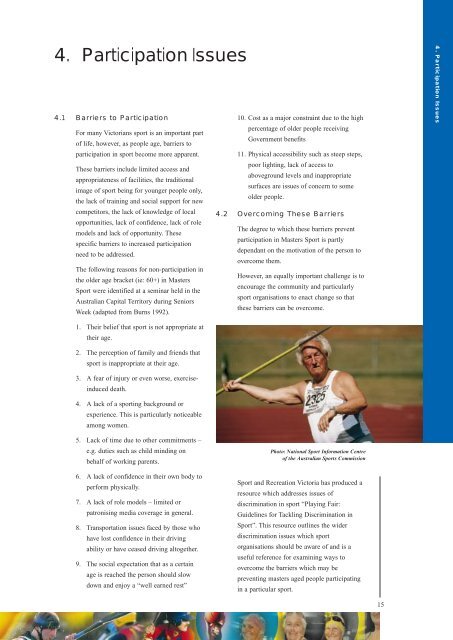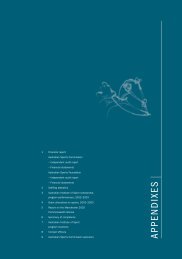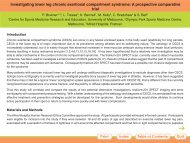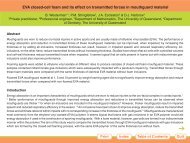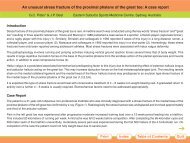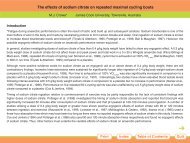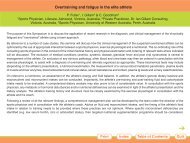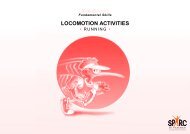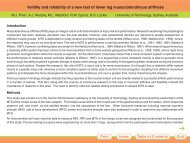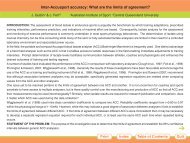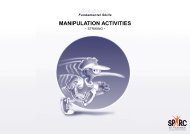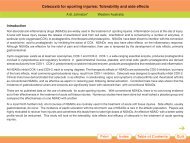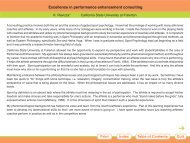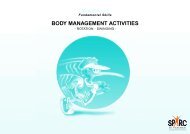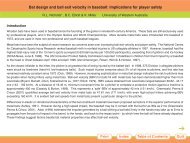Victorian Masters Sport Resource Kit - Australian Sports Commission
Victorian Masters Sport Resource Kit - Australian Sports Commission
Victorian Masters Sport Resource Kit - Australian Sports Commission
You also want an ePaper? Increase the reach of your titles
YUMPU automatically turns print PDFs into web optimized ePapers that Google loves.
4. Participation Issues<br />
4.1 Barriers to Participation<br />
For many <strong>Victorian</strong>s sport is an important part<br />
of life, however, as people age, barriers to<br />
participation in sport become more apparent.<br />
These barriers include limited access and<br />
appropriateness of facilities, the traditional<br />
image of sport being for younger people only,<br />
the lack of training and social support for new<br />
competitors, the lack of knowledge of local<br />
opportunities, lack of confidence, lack of role<br />
models and lack of opportunity. These<br />
specific barriers to increased participation<br />
need to be addressed.<br />
The following reasons for non-participation in<br />
the older age bracket (ie: 60+) in <strong>Masters</strong><br />
<strong>Sport</strong> were identified at a seminar held in the<br />
<strong>Australian</strong> Capital Territory during Seniors<br />
Week (adapted from Burns 1992).<br />
1. Their belief that sport is not appropriate at<br />
their age.<br />
2. The perception of family and friends that<br />
sport is inappropriate at their age.<br />
3. A fear of injury or even worse, exerciseinduced<br />
death.<br />
4. A lack of a sporting background or<br />
experience. This is particularly noticeable<br />
among women.<br />
5. Lack of time due to other commitments –<br />
e.g. duties such as child minding on<br />
behalf of working parents.<br />
6. A lack of confidence in their own body to<br />
perform physically.<br />
7. A lack of role models – limited or<br />
patronising media coverage in general.<br />
8. Transportation issues faced by those who<br />
have lost confidence in their driving<br />
ability or have ceased driving altogether.<br />
9. The social expectation that as a certain<br />
age is reached the person should slow<br />
down and enjoy a “well earned rest”<br />
10. Cost as a major constraint due to the high<br />
percentage of older people receiving<br />
Government benefits<br />
11. Physical accessibility such as steep steps,<br />
poor lighting, lack of access to<br />
aboveground levels and inappropriate<br />
surfaces are issues of concern to some<br />
older people.<br />
4.2 Overcoming These Barriers<br />
The degree to which these barriers prevent<br />
participation in <strong>Masters</strong> <strong>Sport</strong> is partly<br />
dependant on the motivation of the person to<br />
overcome them.<br />
However, an equally important challenge is to<br />
encourage the community and particularly<br />
sport organisations to enact change so that<br />
these barriers can be overcome.<br />
Photo: National <strong>Sport</strong> Information Centre<br />
of the <strong>Australian</strong> <strong>Sport</strong>s <strong>Commission</strong><br />
<strong>Sport</strong> and Recreation Victoria has produced a<br />
resource which addresses issues of<br />
discrimination in sport “Playing Fair:<br />
Guidelines for Tackling Discrimination in<br />
<strong>Sport</strong>”. This resource outlines the wider<br />
discrimination issues which sport<br />
organisations should be aware of and is a<br />
useful reference for examining ways to<br />
overcome the barriers which may be<br />
preventing masters aged people participating<br />
in a particular sport.<br />
15<br />
4. Participation Issues


